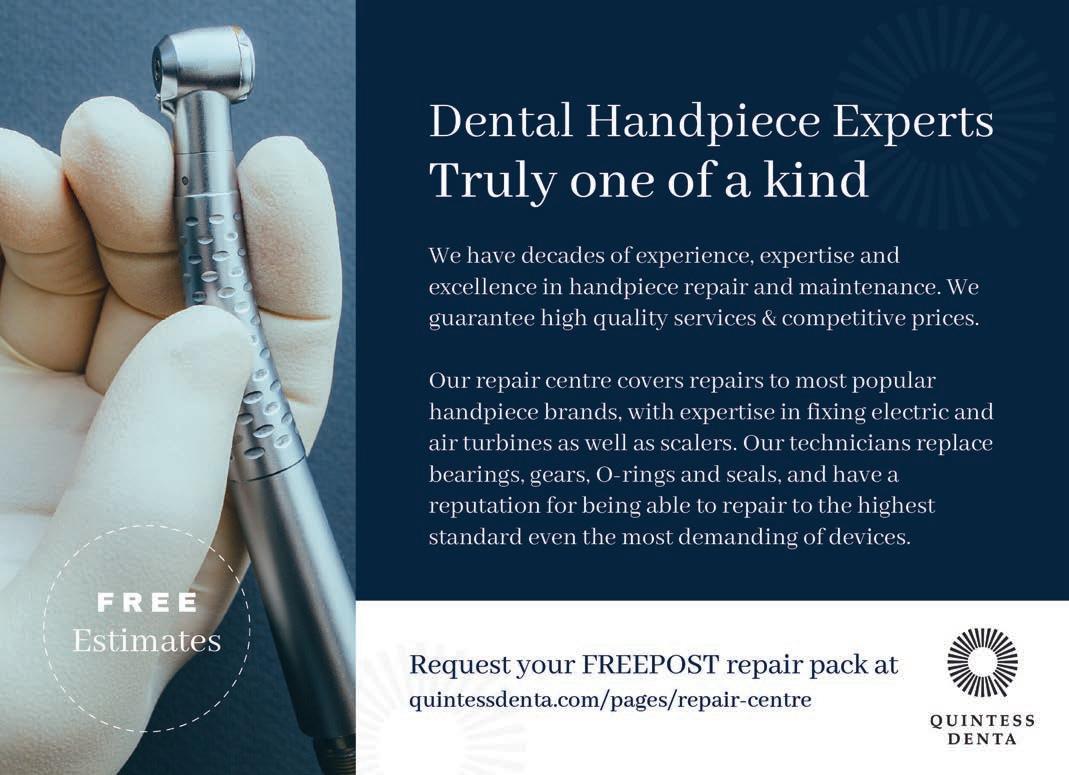CLINICAL FEATURE
Quick chairside interventions to improve oral hygiene for dependent adults
Barriers to oral health There are multiple strands to preventing these poor outcomes for adults with disabilities, including removing plaque and maintaining a healthful diet. Given the central role of plaque in periodontal disease and caries, oral hygiene is the key to oral health for people with disabilities. The key to successful prevention and treatment of periodontal diseases is minimising periodontal inflammation levels lifelong. This can be achieved through effective personal oral hygiene and professional preventive care. However, in practice, this seemingly simple objective is proving elusive. There are many possible barriers to achieving this relating to carers in the home setting, where tooth brushing occurs, and in the dental setting, where risk-based oral hygiene interventions are delivered (Figure 1). People with disabilities often live dependent lives where their choices and agency are diminished in ways that are unimaginable to most of us, unless, perhaps, we too have cared for vulnerable loved ones. For people who were born with disabilities or developed them young, the receipt of care can come to pave their journey through life, whereas for people who acquire impairments
Caoimhin Mac Giolla Phadraig Lecturer, Trinity College Dublin
Ceara Cleary, Dental hygienist, HSE Catherine Waldron, Postdoctoral researcher, Trinity College Dublin
30
Journal of the Irish Dental Association | Feb/March 2022: Vol 68 (1)
Priority and financial barriers
Disgust and fatigue
Hopelessness
Guidance and communication
Ineffective interventions
Care burden
Clinical challenge
DENTAL
unfavourable management of these diseases leads to greater levels of tooth loss and ultimately to oral disability.4 Dental pain can also go undiagnosed and present as challenging, even self-injurious, behaviours, among people with communication impairments. Reparative treatment by the dental team can often necessitate restrictive supports such as anaesthesia, sedation or clinical holding, which do make the treatment of oral disease possible, but also add moral challenges, waiting times and increased complexity of treatment.5 Poor oral health may also have an impact on an individual’s general health.
Collective action
HOMECARE
Dependent adults, such as older adults with dementia and people with disabilities, make up about 10% of the Irish population. There are over 28,000 people registered with intellectual disabilities in Ireland alone. For people with disabilities, oral health can be difficult to achieve and the consequences may impact on them to a greater extent than on others. Oral diseases are often more prevalent and have poorer outcomes. Dental caries, for example, happens at similar rates to the general population, but tends to be treated by extraction among those with disabilities. Globally, periodontal disease can be up to nine times more prevalent among middle-aged adults with a disability, compared to the general population. 1-3 Combined, the increased prevalence and
FIGURE 1: Possible barriers to effective oral hygiene in the home and dental settings for people with disabilities. later (like dementia or frailty), a sense of incremental or even sudden dependency can derail hopes and expectations. Regardless of when one becomes vulnerable, dependency changes how day-to-day activities are planned and days are passed. Oral hygiene might not seem a central focus in the long-term or immediate tasks of dependency and disablement. Surely there are more salient and immediate issues to attend to and resources are, as ever, scarce. There is the daily juggle of waking, cleaning, eating, dressing, toileting and just living, to focus carer energies. These basic human needs must compete with each other for each and every person the carer cares for, and with those of the carer themselves. In the grand juggling act of care, something will inevitably give and, unfortunately, oral hygiene is comparatively optional when prioritising other basic life necessities. The behaviours of oral hygiene are subject to a dilemma, which leads to people placing short-term personal interests over long-term shared goals, despite the outcome ultimately being worse. So, despite carers wanting to maintain oral health in the long term, brushing is hard to get right and, if done effectively from a periodontic perspective at least, has to be repeated once every two or three days for life.6 This deviation from the usual ‘brush your teeth twice a day’ mantra may seem odd at first, so it is worth a brief comment. Often, standards of care are measured by process rather than outcomes. The focus tends to be on how often carers clean teeth rather than how effectively. We do so adopting standards set for people without disabilities; that is, to brush twice a day and floss regularly. In the context of dependent care, this can be impossible, ineffective and demotivating. This may promote a dilution of resources, which contributes to regular ineffective tooth brushing. In essence, the expectation to meet the mouth care norms set for independent others creates a context where to do otherwise is a deviation from an acceptable standard. If we hold unrealistic expectations for carers, we colour deviations from this standard









